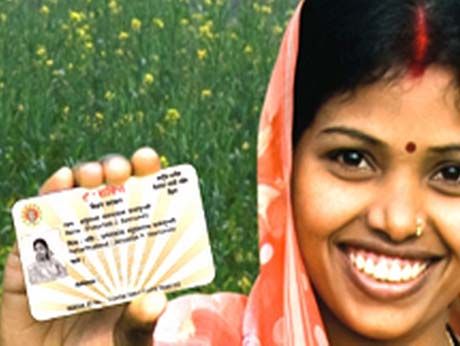
Patna, Bihar Nov 18 2011: Glodyne Technoserve, the technology service provider of the Indian State Government of Bihar, has joined hands with NXP Semiconductors , to fuel the e-Shakti multi purpose identity, employment and bank card with Near Field Communications (NFC) contactless technology.
The e-Shakti project aims to improve the purchasing power of Bihar's large rural population, to stimulate the rural economy and to further develop the Bihar region. Using an end-to-end solution based on cutting edge technologies such as NFC, government officials can register participants as they arrive at work and pay wages directly into their newly created bank accounts -- bringing banking to the unbanked. Using secure handheld terminals, bank clerks can quickly set up virtual banks in even the most rural areas, providing access to full banking services and eliminating the cost and effort required to set up physical branches.
The terminals are equipped with NFC technology, integrated biometrics, and GPRS and GPS technologies to connect directly to the bank's central server. The NFC reader built into the terminals authenticates the user via their contactless SmartMX-based card while biometric data stored on the chip provides an additional level of security.
Says Steve Owen, vice president, global sales Identification, NXP Semiconductors: "India's e-Shakti scheme is an example of the added-value NXP's advanced multi-application ID solutions can bring to millions of people. Our ID technology offers a secure, robust and convenient way for the residents of rural Bihar to identify themselves. In doing so, they gain access to a multitude of services accessed on a daily basis by those living in cities."
Adds Binod Mishra, Sr Vice President and Project Director at Glodyne Technoserve: " Basing card and banking terminals on contactless technology offers numerous benefits. In addition to accelerating transaction speeds, contactless-based systems also require a reduced level of capital expenditure compared to equivalent magnetic-based or contact chip systems. We typically find that contactless systems have longer lifetimes and are much cheaper to maintain, which is essential for states such as Bihar with many rural villages."
Ajesh Kapoor, Director, NXP Semiconductors says: "With approximately 100 million citizens, Bihar is the third most populated state in India, with 85 per cent of people living in rural areas. The e-Shakti scheme is a groundbreaking project that ties in closely to the Indian Central Government's desire to promote financial inclusion for the entire population of India."
www.glodyne.com www.nxp.com